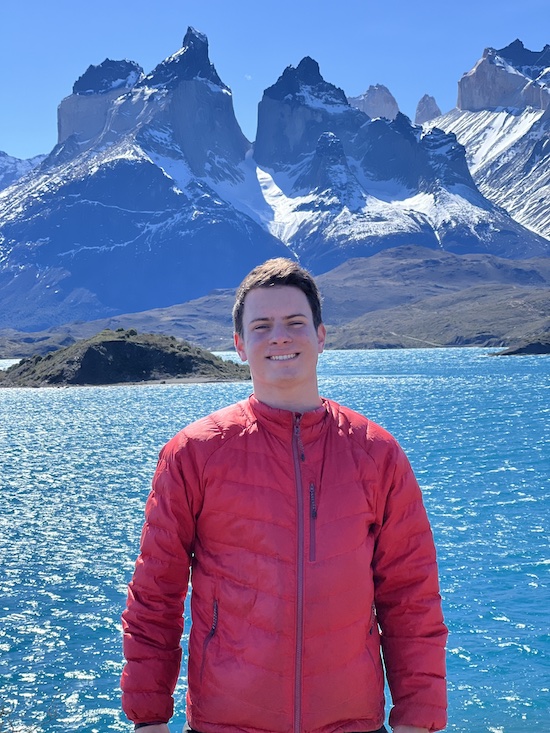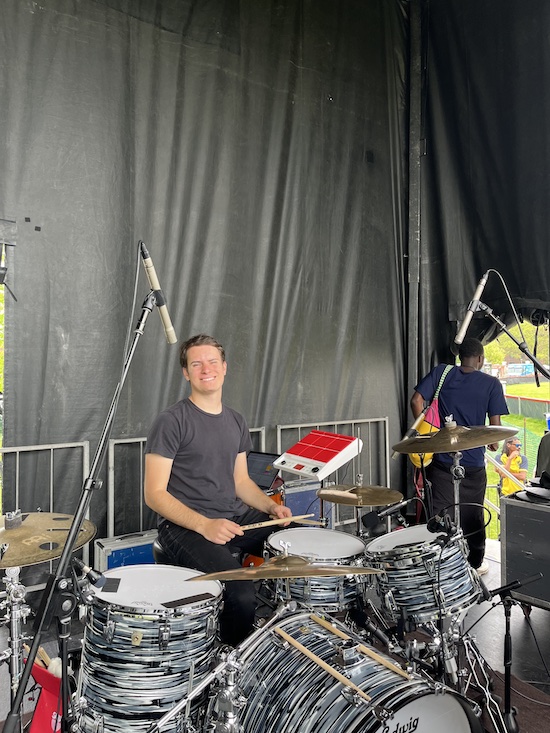
c/o Nathan Weisbrod
This week, The Argus sat down with Nathan Weisbrod ’25, a Tour Guide Program Coordinator for the Office of Admissions and a campus-wide drummer. Weisbrod discussed how to tell the authentic Wesleyan story, his experience with the Latin American Studies department, and how to balance life’s rhythms.
Argus: Why do you think you were nominated for WesCeleb?
Nathan Weisbrod: Well, I try to get really involved on campus and take advantage of various opportunities to meet people in lots of different spaces. So, over the years, I’ve had the opportunity to expand my horizons and, you know, be known…. Should I start over?
A: No! Tell me about some of those different spaces. I know you’re really involved as a tour guide. One might even say King of the Tour Guides.
NW: It has been said, though I view myself more in a coordinator capacity. So that entails helping hire and train and support our wonderful team of tour guides. It’s a really big honor, and I love helping awesome students from all around campus synthesize and convey their authentic Wesleyan experiences to diverse groups of visitors. I’ve also loved giving a lot of tours. Yesterday was number 182, but who’s counting? A couple years ago, I started ending every tour by saying that the point of the college process, for me, is finding the school that is the right fit for you—that’s not measured in ranking, endowment, acceptance rate, name recognition, notable alumni. And Wesleyan is not necessarily the right school for everybody. You know, our goal is not to convince people to like it here, it’s to help them know if they would.
A: Do you have a moment from a tour that you’re particularly proud of?
NW: [Tours are] often a subject of protest, understandably, as there’s a perception of high leverage for families that have not yet committed or given money to Wesleyan. I think maybe the proudest moment of my time here was the night the encampments started. I sent an email to our tour guides about how we do not prescribe any particular message, and that guides could add context. And one of the heads of the encampment and a student who was a counter-protester wrapped in an Israeli flag both approved of the email. And I think that indicated, you know, that we had not solved any big issues, but that we were doing something right as a program to help support students of varying viewpoints in conveying their Wesleyan experiences contextually and accurately.
A: And I know you’re involved in the music scene. One of my first Wesleyan memories was watching you play drums at an open mic on Home Ave.
NW: So, I was [always] going to play drums in college, but it was inconceivable that I would be gifted the kind of opportunities that I’ve had, and been able to meet such wonderful musicians and professors and mentors along the way. You know, I love playing musical theater. I had the opportunity to write the drum parts for some great musicals—for Aubrey’s Pencil Box by Langston Lynch MA ’22 and Camp! by Sarah Linsly ’24 and Eliza Bender ’24. To play licensed shows and then develop parts alongside composers was a really wonderful opportunity. [I got] to open for artists like Sammy Rae, Snail Mail, and A$AP Ferg, and to play in classes like African Pop Ensemble with [Assistant] Professor [of Music] John Dankwa and [Visiting Instructor in Music] Jocelyn Pleasant, and Steel Band with Brielle Scott. And to go into new genres, play with DJs, play with rappers like Nolan Lewis ’25, to play in rock bands and pop and jazz. I just feel so grateful that people want to hang out with me, and that I get to explore all those areas and really grow as a musician, as a listener, as a team member, as a person.
A: In what ways have you grown as a listener?
NW: I got to play with [DJ] Mia Shenkman ’26, and adapt to a musician who’s playing tracks instead of an instrument. The way I fit in and tried to mesh and accentuate beats to the songs and intersperse some chops was a really fun challenge.
A: Thinking back to freshman year, in what ways do you think you’ve changed?
NW: I think I’ve gotten a lot better at feeling good about what I say yes or no to. You know, your friends will still like you if you don’t show up to something on a given night. There’ll be other music opportunities if you can’t do a certain gig; you can take that class later. You know, time is limited in college—and generally. Netflix will always be there. I really try to make the most of the opportunities here and do a lot, but you have to strike some balance. And there are semesters ahead, for many of us. You don’t have to do everything right now. Being able to sustain a pretty high level of involvement is way better than burning out an extremely high level of involvement. And if there’s someone doing something you want to do, ask them how they got there. If there’s a class you want to be in, show up during add/drop and be delightful. I told a professor a couple of years ago that the gods of that class didn’t let me in, and that the gods were her.
A: And did you end up getting in?
NW: The second time I tried, yes.

c/o Nathan Weisbrod
A: How do you feel like your academics have played into those changes?
NW: I am so grateful for the opportunity to have studied abroad in Santiago, Chile. I didn’t anticipate missing Middletown, but there I was, and [now] here I am missing Santiago. But that’s good. I kind of started over there—I was older, I was wiser, but I didn’t know anybody all over again. I wasn’t involved in clubs all over again. I was at a new university again. And it took me a couple of months to, you know, sink in and to start going to musical theater practices for a community theater production of Wicked—Malvado.
A: Looking ahead, have you thought about where you want to live, what sort of life you want to live?
NW: I love the DC area. I think a lot of my interests are certainly well represented there.
A: Lobbying?
NW: We call it advocacy. But I am so excited to hopefully play drums professionally, even at a low level, even for middle schoolers, for the rest of my life. I simply love doing that. I decided a couple years ago I did not want to pursue that as a full-time career. I think that I could play at a level I’m happy with on the side. I’ve encountered professionals who were teachers or NASA engineers, who were working on community theater on the side, and that’s something I wanted to pursue. And I want to try my luck at making a positive impact somewhere else during the day.
A: When you got the WesCeleb email, what did you think, and how did you prepare?
NW: Well, I started by talking to my legal team, which is basically everyone in my family. And it made me reflect on the spaces I’ve been in, the people I’ve met, what I’ve learned and how I’ve grown. In a tour guide intro, we say what we do inside and outside of the classroom. And over the years, that’s shifted. It makes me think about what I want to communicate to people who are just getting to know me.
A: Do any particularly significant moments from your time at Wesleyan stand out to you?
NW: I think finding a new path forward when faced with rejection—whether it was not getting into WestCo two years in a row, and [then] finding a community I really love in ADP [Alpha Delta Phi]. Or not getting into certain classes and that leading to a new major. And, you know, over the course of time, those have been tough moments. But you might find a silver lining that really expands to being a bright point in your experience. Have an open mind, because other things might sneak up on you and actually offer a lot of great opportunities.
The interview has been edited for length and clarity.
Sophie Jager can be reached at sjager@wesleyan.edu.
Thomas Lyons can be reached at trlyons@wesleyan.edu.
Correction: An earlier version of this article misspelled Professor John Dankwa and Malvado.